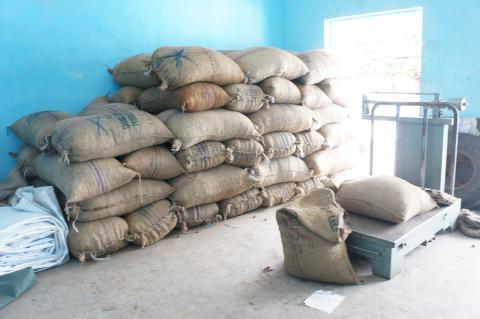Dealing with Africa’s 2014 Harvest Shortfall: The Benin Experience

Although African cashew production continues to rise year after year, there is no avoiding the fact that the 2014 cashew harvest was disappointingly low compared to expectations: while ACA’s analysis projected a continent-wide increase of 10.5% this year, the actual rise was a mere 2.2%.
Different factors in different parts of the continent are responsible for this shortfall: while insufficient rainfall led to lower yields in East Africa, much of West Africa experienced an earlier-than-usual rainy season, posing challenges to cashew tree maintenance and cashew drying, and moreover leading many farmers to neglect their cashew harvests to focus on cultivating crops that were more likely to thrive under these conditions.
This shortage also caused raw cashew nut prices to increase, thereby driving up prices for the processors. For this reason, many processing units across the continent were unable to maintain their full processing capacities this season. In such circumstances, it is wise to examine the national measures that have been taken to try to ensure that this ever-growing industry continues to flourish in difficult times.
For the past five years, the Beninese government has actively promoted domestic processing to encourage local value addition as a means to support the industry. This year, the Beninese Ministry of Trade and Industry, in collaboration with the National Council of Benin Cashew Exporters (CoNEC), launched an experiment designed to ensure that domestic processors would be well-supplied, regardless of market conditions.
Prior to the official commencement of the cashew trading season, the Ministry of Trade and Industry granted exclusive authorization for domestic processors to purchase cashews during a one-month period before the opening of regular trading, enabling domestic processors to purchase the best quality nuts at relatively low prices.
Experimental policies often come with teething troubles, however, and this was no exception. Mr. Rigobert Oura of CoNEC indicates that this “innovative policy unfortunately did not work, for two reasons: the bad faith of processors who benefited from buying quantities exceeding the capacity of their plants, for later export; and other [foreign] buyers who took advantage of this period of derogation to buy too, which caused an early opening of the campaign, followed by disorder.”
The problems were identified quickly, thanks to the vigilance of a multi-stakeholder monitoring committee established for this purpose, whose members represent producers, processors, exporters, buyers, and government ministries. Accordingly, a policy review is underway to ensure that this year’s problems are not replicated in future cashew seasons.
“Benin is now in the process of experimenting with a system of bulk sales. A plan for the universalization of such a system is now in preparation,” explains Mr. Oura. In a system of bulk sales, farmers’ associations and cooperatives negotiate their sales collectively with buyers, thus assuring that processors and foreign buyers cannot circumvent the system by making deals with individual farmers. The monitoring committee will oversee the process, quashing deals which do not comply with the rules.
“In all cases,” adds Mr. Oura, “Benin intends to maintain its policy of prioritizing supply to domestic processors, with an improved and more effective approach.” This policy supports the Beninese government’s goal of processing at least 25% of production domestically by 2020.
Benin’s experiences mirror the challenges faced by cashew-producing nations across Africa: the dire necessity to assist local processing industries to develop and expand, even in years of poor harvest.
ACA’s Market Information Services specialist, Olivier Kabre, observes, “It is rare for any policy to be perfect on the first attempt. What is so encouraging about Benin’s experience here is the way in which all stakeholders in the country’s cashew value chain have been so closely involved in monitoring the progress of the experiment, and that policies are being quickly and transparently modified to remedy unexpected challenges."




